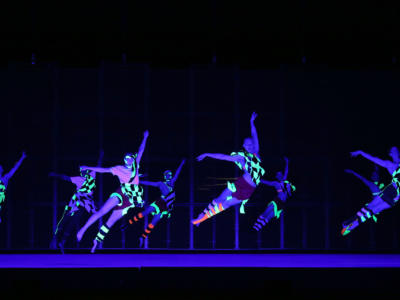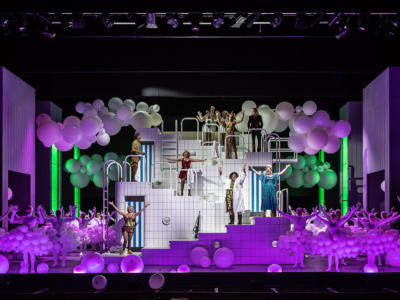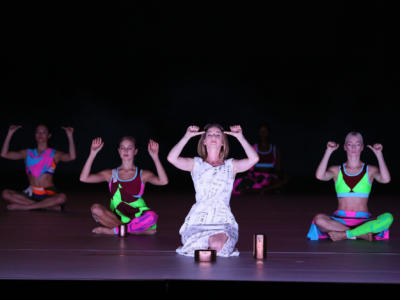ENO Response: Orpheus in the Underworld reviews (Part II)
21st October 2019 in News
ENO Response is a new scheme that gives aspiring journalists and reviewers the opportunity to produce opera reviews and receive writing advice and feedback.
ENO has had no editorial input in the reviews. All views are their own.
Alex Grant-Said

The devil saunters on stage, proudly displaying his stuck-on Halloween tail to the audience and the worry is that Orpheus in the Underworld is going to be gaudy West End panto all the way; an over-egged production from a theatre director making her opera debut. But this is Emma Rice’s brilliant trick, deliberately disarming: the devil is still the devil whether you take his vaudeville winks seriously or not.
When a chorus of high-heeled women totter on wearing inflatable beehive hats, waving winged balls on sticks and making ‘bzzzzz’ noises – the audience laughs.
When Pluto lord of hell, disguised as harmless shepherd Aristaeus sings a ridiculous pastoral ballad about how he loves to caress his honey bees – the audience laughs.
It’s only later in the Underworld when those same bees are shown to be the souls of abused women that his earlier throwaway warble, “I love to crush them between my knees” returns with darker meaning.
By the time the can-can of Moulin Rouge fame comes, Underworld’s big denouement, a traumatised woman is propelled forward and forced to keep time with the dancing, her skimpy clothing pawed at by trench coat clad men – the audience stops laughing but the glitter and balloons and fishnet stockings keep bouncing on stage. Beneath all the toothy smiles and circus acts, Emma Rice is exploring something sinister and quite uncomfortable.
She’s given the original libretto needed updates, mostly to flesh out Eurydice who is the central protagonist here. A fast-forward prologue reveals that it’s not female promiscuity that causes her to run into the arms of Pluto and end up his prisoner, the case in both Offenbach’s operetta and the original Greek myth, but the unexpected death of her baby and subsequent breakdown of her marriage with Orpheus. Apart from the odd wince-inducing line – “we were on a break!” – Rice’s additions are very natural and give a previously two-dimensional myth needed depth.
Mary Bevan capably handles the centerstage demands with frequent tears and high notes and lots of running around. That her only moment of reprieve comes when Eurydice lies back to have sex with a puppeteered fly says something of the role’s relentless physicality.
But it’s shame that so much hard work has gone into revising the female lead and left the titular Orpheus untouched. He stays a 19th century comic strip, relieved to learn his wife is dead, only journeying to retrieve her when persuaded to do so. It’s therefore difficult to invest in the couple’s relationship and Love, which the gods complain no longer exists doesn’t seem to be there in the first place. Perhaps this is Rice’s point but with none of her male characters possessing any redeeming qualities there’s a danger of one-sidedness in an otherwise compelling feminist retelling.
Caricature works spectacularly for the gods though. Brilliant costumes tell you exactly who each deity is in a single glance. Idunnu Münch’s Diana, goddess of the hunt is a fierce Beyoncé figure in leopard print sarong. A physically imposing Keel Watson sports a camo shirt under his white bathrobe and constantly clutches an AK-47 as the war god Mars. It’s refreshing to see lowbrow incarnations of these Classical figures. There’s a sense that this is how an ancient Greek theatre-goer would have enjoyed his pantheon, red-blooded and loud.
Lizzie Clachan’s set design forces us to gaze upwards at the Olympians as they are revealed lounging eternally poolside. They’re bored and pampered, bellboys bringing martinis up and down the steps of their pristine white-tiled members’ club. It’s a funny premise. Very funny.
Their Descent into the Underworld is achieved with simple rotation, neon XXX signs replacing white inflatable clouds as heaven and hell are very much shown to be two sides of the same structure. And this is Underworld’s central idea, the reason for Offenbach penning his satire in 19th century France and why its staging is so relevant now.
“The world has gone to hell,” the gods sing, literally dragged there by their immoral leader Jupiter. The king of the gods brushes off #MeToo allegations with an easy wave of his cigar whilst committing further abuses of power behind the other gods’ backs. There is no higher authority to beseech. No accountability. Just before the curtain drops, amidst thunder and shouting we see god shaking hands with the devil and in the silence that follows the question asked is ‘where do we go from here?’ Underworld does what all good opera should and presents something worryingly familiar with plenty of fun and spectacle to help the medicine go down.
Naomi James-Mitchell

Emma Rice’s reimagining of Offenbach’s 1874 operetta, to 1957 London told a story of Orpheus with a distinct lack of our leading man. Instead I believe Rice should have renamed it ‘The Trials of Eurydice’.
Rice took the myth of Orpheus and transformed it into a relatable, real and slightly unsettling tale of injustice. The intention to highlight and centre the story around the sexual mistreatment and emotional abuse Eurydice (Mary Bevan) experiences was especially poignant amidst the #metoo movement. I believe Rice’s choice of having the operetta take the form of a panto was ingenious in delivering the blunt story of Eurydice’s abuse subtly but effectively. This was proven by the second half where Eurydice is intended to be the butt of all the jokes, insinuating her to be a sex-crazed whore, whereas Rice highlighted her as a victim of sexual trafficking due to selfish patriarchal supremacy complexes; the jokes then turned into cringe worthy unwanted advances on Eurydice.
Orpheus (Ed Lyon) has, along with Mary Bevan, outstanding vocal abilities; but took a backseat (quite literally) in his own myth! In my opinion, Orpheus became an arbitrary character, and in doing so, I lost all sympathies towards him and didn’t much care for his story arc. His character was portrayed very one-dimensionally, and I would have appreciated him to have a more complex motive to want his wife back. In parts he seemed to relate closer to an obsessive stalker, rather than a bereft and broken husband.
In Orpheus’ lieu, Plato took centre stage. The up and coming ENO Harewood Artist Alex Otterburn excelled in his role as the eccentric and camp devilish ruler of the underworld. My eyes couldn’t help but be drawn towards Plato while he was onstage. He was extravagant without being over the top, had outstanding stage presence and was understated where necessary. Plato’s nature was acutely aligned to that of Jupiter (Willard White) and together they became an unlikely duo instrumental in the demise of Eurydice. The way Emma Rice structured this operetta allowed their comradery to be subtle in its inception but strikingly impactful in its completion.
The infamous can-can felt weak when first introduced but held its own in the reprise. The chaotic construction of this number perfectly mirrored the chaotic nature of the last scene where you ultimately see the death of Eurydice’s hope and happiness. My only criticism is that the reprise of the can-can should have lasted longer and the can-can be cut shorter.
The stage was epic with the bath-style Olympus layout, reaching high into the sky and perfectly encapsulating the grandeur of the gods. This was also true of the seedy, sleazy peep show setting for hell, effectively creating a promiscuous and uncomfortable place for hell. The set designer (Lizzie Clachan) was very effective in collaborating with the costume designer (Lez Brotherston), to match the characters to their world, but an obsession over balloons was, I must say, overdone. I appreciated the uses of the balloons most of the time, but they were not necessary for the dancers in the can-can. During the can-can I feel that having only red balloons on Eurydice’s costume would align with the theme of the underworld better than a multicoloured outfit. Due to this overuse of balloons we ended up with two sheep casualties in this performance! On another note, they (Clachan) did work well with the lighting designer (Matthew Monaghan) in creating appropriate atmospheres for each of the different places during the operetta.
It must be said that the dancing in this operetta was surprisingly enjoyable. I find that many opera performers look uncomfortable and awkward when given movement directions more advanced than walking; but the choreographer (Etta Murfitt) worked miracles. In this production there were fully choreographed numbers you would find more suitable to be in a musical than an operetta. The ENO chorus met this new physical demand with gusto, (especially the left side of the stage during act two) their energy intern energised the audience and created a more intimate experience making the audience feel more comfortable in interacting with the performance. The choreography was executed effectively and necessary for the success of the operetta.
What I particularly respected about this performance was the sign language interpreter that was present throughout the operetta. This is the way all operas need to go to become inclusive and accessible for all. Though the ENO should consider installing a larger screen in the auditorium so that the sign language interpreter can be seen from all seats in the auditorium, not just the ones at the front.
Verdict: Rename this ‘The trials of Eurydice’.
4/5 stars
Robyndra Allen

I have never found an opera so compelling yet so viscerally uncomfortable to watch. This production of Offenbach’s Orpheus in the Underworld is one I would without question recommend but is certainly not for the fainthearted. When Offenbach wrote Orpheé aux enfers in 1858 it was deemed shocking due to its lasciviousness, and outrageous due to its blasphemous nature. Watching it in 2019, I was, in fact, both shocked and outraged (although I may just have 18th century sensibilities) I really feel like the production team, headed by director and English book writer Emma Rice brought the show into the 21st century.
The original issues which the opera exploited have not been allowed to lose their power. When first performed, the overt sexuality of the opera was its shock factor. Now it is the overt sexuality of the production in respect to the objectification of women that is the shocking element. The team have cleverly altered the detail of the original opera to make it something relevant to the issues of today. Offenbach’s famous can-can in hell was a prime example of this. It was really, truly hellish. This was not, however, due to the Gods acting debaucherously nor due to the excess of flesh, drink and merriment on show but to Eurydice’s position throughout it all. She appears on the scene in a skimpy get up covered in balloons. These are painfully popped throughout a dance sequence where Mary Bevan, playing Eurydice did a fantastic job of appearing tense and uneasy. The real kicker is that she has been told by the all-powerful Jupiter that doing this is the only way she will escape Pluto’s clutches and Hell. Audience members were cringing in their seats. It was starkly reminiscent of the gruesome nature of the power that men in high-up positions hold. It reminded one of Harvey Weinstein, of Kevin Spacey. The whole section was made even more poignant by the fact that in the end Orpheus never saves Eurydice. Pluto and Jupiter win her forever.
It should be said, however, that this is a production full of camp, silliness and glitter that is an absolute ball to watch. A stand out performer is Alex Otterburn playing Pluto. He kicks the whole show off with a smirk that travels right to the back of the upper circle and a perfectly crafted camp physicality. His vocals were also impeccable. The real vocal star of the show was Mary Bevan however. A moment in which she suddenly sings along with Orpheus’ violin in a beautiful screech of discontentment showed off her immense talent. The note was pitch perfect immediately and immaculately delivered with support and clarity of tone.
Seldom does one see a production where the props and set deserve their own paragraph but Lizzie Clachan really excelled herself in this instance. ‘Heaven’, where we first meet all the gods, which in reality was a moving block with layers and decks in the style of a cruise ship was a stand-out point. Having a (moving!) taxi was also very exciting. Everything looked modern and fun. The detail of the behind-stage work was such that a chorus member handing props to the stage from behind a red curtain was wearing matching red gloves.
The show did however suffer from a couple of faux-pas. It took perhaps too light a tone to the issues of sexual assault and manipulation that it was touching upon, with the words ‘non-consensual sex’ at at times inappropriately used as a punch-line. The commentary on these issues also made it seem highly gratuitous that Eurydice delivered her first aria in her pants. Additionally there were moments that were slightly too trite. For example, “you said it sister” (a line delivered by Lucia Lucas playing Public Opinion) simply could not have been received sans-cringe.
Despite these issues I would watch this Opera again and again. It was not a simple production, it had multi-layered messaging interweaved with the glitz and the glam and was a show that endeavoured and succeeded in giving the audience member months’ worth of thought-fodder.



